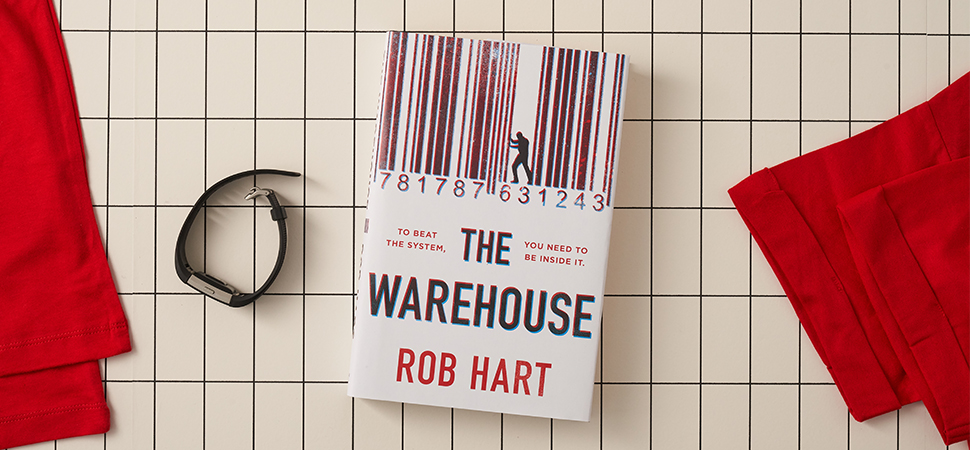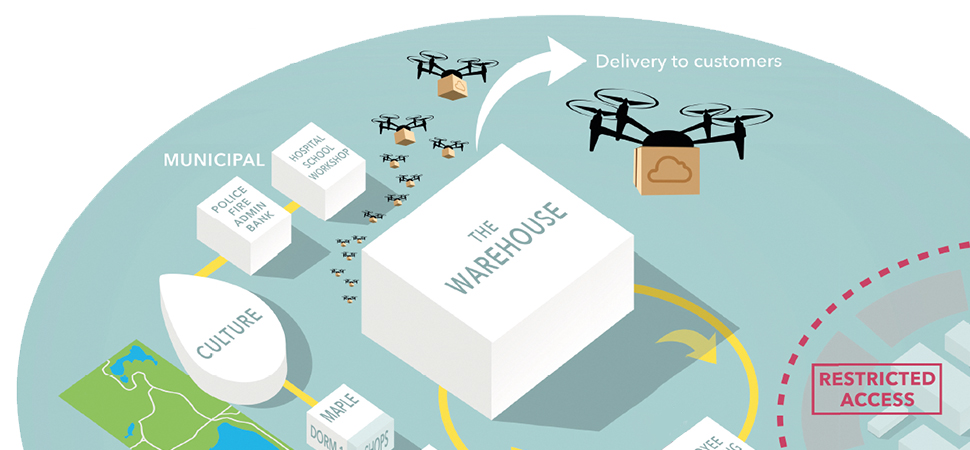- Home |
- Search Results |
- The Warehouse by Rob Hart
The Warehouse by Rob Hart
Rob Hart’s dystopian thriller The Warehouse is all too plausible. Amongst the wreckage of the near-future, online retailer Cloud reigns supreme. But, as new recruit Zinnia is about to discover, beneath Cloud’s sunny exterior lurks something far more sinister…

Zinnia grabbed the CloudBand off the charging mat and strapped it around her wrist. It buzzed and said: Good morning, Zinnia!
Then: Your shift is due to start in 40 minutes. You should leave soon. The words were replaced by a pulsing arrow that pointed toward the door. She stood, turned in a circle. The arrow spun, never leaving the door. As she stepped outside the watch buzzed against her wrist and the arrow swung to the left, pointing toward the elevators.
She followed the arrow down to the tram, where a massive group of people waited. There was a spectrum of polo colors, but mostly red. A tram car slid into the station, filled up, and left. Zinnia watched two more. When she managed to make it aboard the fourth, the space filled until she was shoulder to shoulder with the people around her, all of them doing the commuter shuffle, elbows tight to their bodies, shifting their weight with the movement of the car to keep upright.
The crowd getting off at the main warehouse facility were mostly young, fit. No older folks, no heavy folks, no one with any clear disabilities. They all drifted toward the end of a long queue that snaked around a large room, marching through lanes cordoned off by stanchions.
At the end of the line were three turnstiles, a revolving set of metal arms that only one person could step through at a time, after scanning their watch at the disc on the front.
A series of video monitors was built into the walls, all of them showing a clip in which a man bent over to pick up a box, arching his back. A buzzer sounded and a red X appeared on the image. The same man bent at the knees, keeping his spine straight, and there was a ding and a green check mark appeared.
Then, a woman calmly walking with a box to a conveyor belt. The screen froze, and the words Walk, don’t run appeared.
Then, a man carrying a box that seemed to be too heavy for him.
Inform a manager if you can’t lift an object heavier than 25 pounds.
Then, a woman climbing the side of a shelving unit, like a monkey. Buzz. Red X. Always use your safety harness.
When it was Zinnia’s turn at the turnstile, she stepped through and walked down a hallway into a space so massive it made her a little dizzy, trying to process it all.
Shelving units stretched as far as she could see. The inside of the place had a horizon line. She couldn’t see the outer walls from where she was standing, just mammoth support columns, reaching up to the vastness of the ceiling, which was lower than she would have expected. Three stories. Maybe four. The shelving units themselves were twice her height, and they slid across the polished concrete floor, spinning around and switching spots with each other. Men and women in red polo shirts dashed back and forth between them, digging out packages. The space was snaked with conveyor belts marked in yellow, items flying across the rollers.
Spinning metal and slapping feet and the soft whir of machinery melded into a symphony of chaos. It smelled of motor oil and cleaning supplies and something else. That gym smell. Aerosolized sweat and rubber. The air was both cool and slightly humid. Zinnia stood and watched this great machine, dancing, oblivious to her, almost to itself.
Her wrist buzzed. Another arrow. It prompted her to walk forward, until it buzzed again, the arrow switching, moving her to the right. She glanced up and down, from the watch to the space in front of her, careful to avoid the red runners and the spinning machines, having to stop every dozen steps to let someone pass so she wouldn’t get knocked on her ass.
So much for Walk, don’t run.
After a few more turns she realized the buzzing was different for each new direction. The side of the watch closest to her wrist joint buzzed when it wanted her to go right. Back or forth, it would buzz the bottom or the top. It took a minute, but once she noticed it, she couldn’t not notice. A few more turns and she found she could navigate by feel without looking down.
“Pretty cool, huh?”
She found herself at a far wall, or maybe just a freestanding structure in the middle of the warehouse floor. She couldn’t tell. Leaning against the wall was a young Latino man. Strong, hammered forearms with curly black hair.
“Miguel,” he said, extending his hand. The band of his watch was fabric, and dark green, like fresh leaves. “I’m here to help you get acclimated.”
“Zinnia,” she said, returning the shake. The skin of his hand was cracked and callused.
“Okay, mi amiga, you seem to have gotten the knack of the directionals. So, let’s walk around a bit and I’ll explain the mechanics of all this. Then we can get started.”
Zinnia held up her wrist. “So this really is your lifeline, isn’t it?” “Only thing you’ll ever need to get around. Follow me.”

Miguel pushed off the wall and strode along it, the expanse of the warehouse floor to their left, and to their right: offices, break rooms, bathrooms, broken up by long stretches of walls that featured video screens playing a clip of the commercial they’d watched on the bus ride over.
The young mother. The bandages.
“Honestly, if it wasn’t for Cloud, I don’t know what I’d do.”
There was added footage. Happy, shiny people working at Cloud. People picking items out of bins, placing them on conveyor belts. The occasional testimonial from a satisfied customer.
An Asian kid in a dorm room.
“I’d never have passed my midterm if I didn’t get that textbook in time.”
A young black girl in front of a dilapidated house.
“There are no bookstores or libraries in my neighborhood. If it weren’t for Cloud I wouldn’t have any books at all.”
An elderly white man sitting in an old-fashioned living room.
“It’s hard for me to make it to the store these days. Thank you, Cloud.”
“Welcome to the floor,” Miguel said, spreading his arms. “That’s what we call it. All these pretty folks are reds.” He pinched the fabric of his polo shirt. “The whites are the managers. They roam around and keep an eye on things. Speaking of, if you have an issue, just press the crown of the watch and say manager. It’ll send you to the closest one who’s free.”
Zinnia looked down at her watch. Wondered if it listened only when the crown was pressed. Probably not.
“So the gig is pretty simple,” Miguel said. “Seriously, the watch does most of the work for you. It’ll give you directions to an item. You find the item. You pick it up. It’ll give you directions to a particular belt. You drop the item. Boom. Next one. You do that for nine hours. Two fifteen-minute breaks for the bathroom, plus a half hour for lunch.”
“You can’t just go to the bathroom?” Zinnia asked.
“Let me introduce you to the yellow line, mi amiga.” Miguel held up the watch, tapped the face. Running along the bottom, hair-thin, was a green line. “It doesn’t look so bad now, but once you get started, this tracks your progress. Green means you’re making rate. If you’re lagging behind, you drop into yellow. You hit red, your employee ranking plummets. So don’t hit red.”
“These folks are really obsessed with their colors, aren’t they?” Miguel nodded. “Lot of people here who don’t speak a word of inglés. Anyway, to your question, too much time in the bathroom, you fall behind. Best to hold it. And a thing about breaks . . .” He stopped. Raised an eyebrow, as if he needed to emphasize the point. “You get a half hour for lunch. If you’re all the way out in the hinterlands, it could take up to twenty minutes to make it to a break room. The algorithm is supposed to keep that from happening, but it happens. My advice—the protein bars in the vending machines keep pretty well. Carry one in your back pocket. Better to get the calories.”
“What about water?”
Miguel shrugged. “There are water fountains everywhere. Stay
hydrated. You’d be amazed with so much space, but it can get hot as hell in here sometimes.” He looked down at her feet and grimaced. “And get some sneakers. Order them tonight. Trust me—those boots are not going to feel nice in a few hours.”
“Yeah, I figured that,” Zinnia said. “So you pick stuff up, drop it on the conveyor. What about larger items?”
“Different part of the floor,” Miguel said. “And you only ever get there once you’ve been here a bit. Entry level is strictly stuff under twenty pounds. Hold on . . .”
He put his arm up, not touching Zinnia, but making sure it was close enough to get her to stop walking. A girl in a red polo flew past. Zinnia had barely seen her in her peripheral vision. The girl’s hair was whipping around her face and she was sprinting, hard, something tucked under her arm. Face nearly purple from exertion, and maybe tears. She hit a corner, turned, and disappeared.
“Building on fire?” Zinnia asked.
“Getting to the end of her shift,” Miguel said. “Way the algorithm works, you’re supposed to have enough time to walk to your item, pick it up, and bring it to a belt, all at a brisk and deliberate pace, right? Doesn’t really work like that. Sometimes the bugs have things moved around. Sometimes stuff isn’t shelved right, so you lose time looking for it. Sometimes by the end of your shift, you’re motoring to replenish that line.” He pointed to another young man hauling ass down a row and disappearing. “You come in too far behind too many times, your rating goes down.”
“Bugs?” Zinnia asked.
Miguel stepped down an aisle, waved for her to follow. He brought her to a shelving unit, crouched, and pointed underneath, to a little yellow dome on wheels, hooked into the bottom of the unit. Then he kept pointing, along the floor, to stickers with scanner codes placed on the concrete.
“The little yellow things that move them around, we call them bugs,” he said. “So, how about we do our first pick, so you can get a feel for it?”
“Sure.”
Miguel raised his wrist to his face, pressed the crown. “Preliminary training complete, on to step two.”
Zinnia’s wrist buzzed. Another arrow. Miguel placed his hand in the air, palm up, and bowed.
“After you, mi amiga.”
